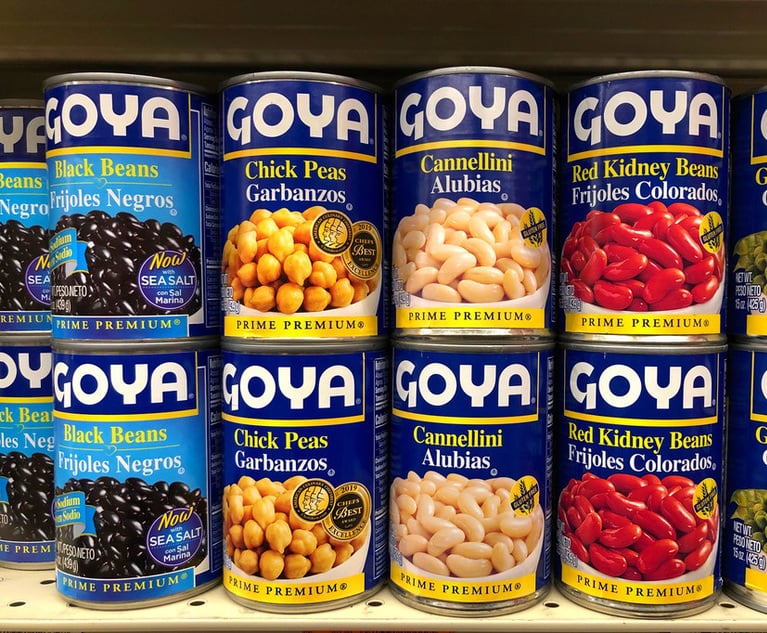New Guidance Issued for Post-Covid Franchise Financial Performance Disclosures
In response to what it perceived as the significant impact the COVID-19 pandemic has had on many franchise businesses, on June 17, the North American Securities Administrators Association (NASAA) Franchise and Business Opportunities Project Group—the quasigovernmental organization of federal and state franchise regulators that coordinates regulatory policy nationwide—issued guidance
June 29, 2020 at 01:26 PM
13 minute read
 David J. Kaufmann
David J. Kaufmann
In response to what it perceived as the significant impact the COVID-19 pandemic has had on many franchise businesses, on June 17, the North American Securities Administrators Association (NASAA) Franchise and Business Opportunities Project Group—the quasigovernmental organization of federal and state franchise regulators that coordinates regulatory policy nationwide—issued guidance (the FPR Guidance) advancing new requirements, restrictions and prohibitions pertaining to Franchise Disclosure Document Item 19 franchise network historic financial performance representations (FPRs) (accessible at https://www.nasaa.org/wp-content/uploads/2020/06/FPRs-in-the-time-of-COVID-19.pdf).
(Full disclosure: this author has for 25 years served as one of 12 outside advisors to the NASAA Franchise and Business Opportunity Project Group—six representing franchisor interests, six franchisee interests—but it is noteworthy that, for the first time in memory, the advisers' input and counsel were not at all sought in connection with the Franchise and Business Opportunity Project Group's promulgation of the FPR Guidance examined in this column.)
The FPR Guidance includes factors franchisors should consider when determining current and future use of historical financial performance representations, while cautioning that franchisors cannot avoid obligations to update franchise disclosure documents by including disclaimer language suggesting that franchisees should not rely on disclosures that do not reflect the impact of COVID-19.
The NASAA Franchise and Business Opportunity Project Group's FPR Guidance is not meant for franchisors alone. To the contrary, its guidance is also directed to state franchise regulators who are reviewing franchisor financial performance representations in the midst of COVID-19. Unlike previous NASAA Franchise and Business Opportunity Project Group statements of policy (which ultimately were issued through NASAA itself), this COVID-19 guidance is informal and is issued only by the NASAA Franchise and Business Opportunity Project Group. (A formal NASAA statement or policy on this matter would have taken many months to consider and release and state franchise regulators are seeking guidance now.) The FPR Guidance notes that franchisors should be prepared to respond to comments from state franchise examiners asking for an explanation of how a franchise performance representation based on data compiled in 2019 complies with franchise law requirements. (In fact, this author's law firm has already received a number of such comments.)
The NASAA Franchise and Business Opportunity Project Group's FPR Guidance, titled "Disclosing Financial Performance Representations in the time of COVID-19," begins by noting that as a consequence of the COVID-19 pandemic and government responses thereto, by March 2020 many businesses had to cease operations and others had to change how they delivered goods and services to customers. These changes have lasted for many months and may continue in effect, asserts the FPR Guidance, even after states begin allowing more businesses to resume operations. The FPR Guidance states: "It is possible that some franchise businesses may need to change their business models permanently, and some may cease operating entirely. Although franchising has weathered other economic upheavals and natural disasters in the past, the COVID-19 pandemic's impact on franchise systems appears to be unprecedented."
Since all franchisors are required to amend their franchise disclosure documents no later than 90 or 120 days following the close of their most recent fiscal year (depending on the franchise statute involved), and since nearly all franchisors are now on a calendar fiscal year, the franchise amendment/renewal thrust annually kicks into high gear starting in early March and continues through late May. It is at this time that state franchise regulators are inundated with FDD amendment/renewal applications for registration or exemption. Many franchisors doing so this year included in Item 19 of their FDDs the financial performance representation based on network results from 2019 (and perhaps previous periods) that predate the impact of COVID-19. In response, the FPR Guidance reveals that "(s)tate franchise administrators reviewing FDDs of franchisors that have applied for registration have asked for guidance on whether franchisors can make Historical FPRs in 2020 considering the significant impact of the COVID-19 pandemic … and what, if anything, franchisors must do in the future to ensure that the information contained in a Historical FPR meets the requirements of federal and state franchise law."
The FPR Guidance then reviews various obligations of state franchise laws that may impact this critical issue: the affirmative obligation under certain such laws to continue to update all material disclosures that are included in a Franchise Disclosure Document (including financial performance representations); the need to amend an FDD to reflect any such material changes to the information contained in a registered FDD; and, the requirement that franchisors comply with the anti-fraud provisions of state franchise registration/disclosure statutes (which make it unlawful, generally, for a franchisor to make an untrue statement of material fact or omit to state a material fact that would make a statement not misleading).
The FPR Guidance then argues that "(u)nder some circumstances, an FPR that discloses historically accurate data may contain an omission of a material fact, or an untrue statement of material fact, if material changes have occurred to that FPR by the time it is provided to a prospective franchisee." Accordingly, the FPR Guidance warns that whether a franchisor can make and continue to use an historic FPR in 2020 (and beyond) without amending that disclosure to reflect the impact of COVID-19 depends on a number of factors, including:
- Whether the franchise business has been significantly impacted by COVID-19.
- The type of data the franchisor includes in the FPR.
- The reasonable inferences a prospective franchisee can draw from the FPR.
- When the franchisor estimates a prospective franchisee can expect to open for business after entering into a franchise agreement.
- Whether and how the franchisor adapts the franchise business to account for current market conditions resulting from COVID-19.
- Whether and how the franchisor adapts the franchise business to account for future marketing conditions resulting from COVID-19.
The FPR Guidance notes that not all franchised businesses have been negatively impacted in a significant way by COVID-19 and, in fact, some have experienced an increase in revenues. Other franchise systems, notes the Guidance, have experienced reductions in revenues or increased costs because of COVID-19, but those changes may not be material.
Most critically, the NASAA Franchise and Business Opportunity Project Group's FPR Guidance states:
If outlets represented in an FPR have experienced material changes in financial performance, the franchisor may no longer make a Historical FPR that is not updated to reflect those changes. Therefore, franchise systems that have been significantly impacted by the COVID-19 pandemic should consider whether they can continue to make a Historical FPR in 2020 that does not include updated disclosure reflecting the impact of the COVID-19 pandemic on the franchise business.
The Guidance notes that, as a consequence of COVID-19, some franchise systems have changed or will change how they deliver goods and services to the public (restaurants may have started or expanded takeout and delivery services, gyms may limit the number of members allowed at any one time, etc.). Some of these adaptations may be temporary but others may be permanent to adapt to new consumer demands and attitudes in the post- COVID world. The FPR Guidance warns that once management of a franchisor concludes that it will make changes to its franchise system or business model that will materially impact its 2019 historic FPR, the franchisor may no longer include an historic FPR that is not updated to reflect those changes and their impact on the FPR.
The NASAA Franchise and Business Opportunity Project Group concludes it FPR Guidance by warning that franchisors cannot use simple disclaimers to avoid having to update their FPRs to reflect material changes wrought by COVID-19. The Guidance thus forbids a franchisor for merely stating that its historic financial performance representation "… is not representative of what prospective franchisees can expect as a consequence of COVID-19, that the franchisor cannot predict how the franchise system will be affected by COVID-19, or otherwise suggest that prospective franchisees should not rely on the [financial performance] disclosure." The Guidance suggests that "(a)lthough some franchisors may argue that statements like these are purely factual and accurate, the language can only be viewed by a prospective franchisee as a further admonition not to rely on the information presented."
There are reasons to disagree with the approach followed by the NASAA Franchise and Business Opportunity Project Group FPR Guidance. Yes, COVID-19 will certainly impact many franchise networks' financial performance this year (and perhaps beyond). And true it is that many franchisors may vary their business models to meet consumer demands and preferences altered by COVID-19. However, as federal and state franchise regulators repeatedly observe, obtaining historic financial performance representations is a key concern of prospective franchisees. Limiting or eliminating their use altogether would rob prospective franchisees of a critical evaluation tool necessary for them to make informed investment decisions.
Further, we note that there is absolutely nothing misleading about setting forth truthful 2019 (and earlier) financial performance results in a 2020 Franchise Disclosure Document. Simply stated, those were the actual results. Will they be repeated in 2020? Perhaps not. But conflating accurate historic financial information (from 2019 and earlier) with what may pertain in 2020 is a fundamentally erroneous conflation of past and future. Under all federal and state franchise laws, franchisors can disclose either past (historic) financial performance results for their networks or, under limited circumstances, projected results. But the FPR Guidance for the very first time melds these two very different types of financial performance data.
And it leads franchisors down a perilous path. They may now face challenges (both from regulators and franchisees) that their entirely truthful historic financial performance representations are tainted and unlawful because they weren't updated to address the impact of a veritable universe of subsequent events— not just COVID-19 but extended spells of bad weather (for travel and guest lodging franchisors), economic recessions (for all franchisors), the incidence of food borne illness upon restaurant franchisors (think Mad Cow disease) and any other such variables of one kind or another which always pertain but have never before required a franchisor to amend its historic financial performance representations. The easiest example? Think back to 9/11: air travel came to a virtual halt, hotels and other guest lodging facilities saw their occupancy rates dwindle sharply, vehicle rental concerns likewise saw business drop. That was the consequence of what transpired on Sept. 11, 2001. But no one then ever suggested that the historic financial performance representations covering the preceding year, 2000, were in any fashion not true and accurate. Again, there will always be an event or circumstance that could impact the continuation of prior years' financial performance and, under the FPR Guidance, franchisors will now be challenged at every turn for not referencing this or that particular event or circumstance in an update to their historic FPRs.
The only way franchisors can protect themselves from this peril generated by the FPR Guidance will be to propound a series of disclosures addressing possible variables which may pertain going forward that could impact their historic FPRs—the type of 40 page set of "risk factors" commonly found in securities offerings which would ridiculously bloat the Franchise Disclosure Document.
Moreover, it should be recalled that all federal and state franchise laws require that franchisors set forth in Item 20 of their Franchise Disclosure Documents the names, addresses and contact information for all franchisees currently in their networks as well as those who have departed in the past three years. So it is that prospective franchisees can easily ascertain the impact that COVID-19 may have had on a subject franchise network simply by calling the franchisees of that network. But the FPR Guidance may prompt many franchisors from eliminating FDD Item 19 financial performance representations altogether, an ironic result given that the franchise regulatory community decades ago, in an effort to prompt more franchisors to make Item 19 disclosures greatly liberalized the rules governing same.
Lastly, the notion that franchisors—the vast majority of whom just completed the months-long endeavor of amending and then renewing the registrations of their 2020 Franchise Disclosure Documents, must now cease all franchise sales activity while they again amend those FDDs to address the impact of COVID-19 is untenable. Obtaining registrations from state franchise regulators can take many weeks and even months (for example, as of June 20, Minnesota has still not gotten around to reviewing FDD amendment applications submitted in late April). And if, as the FPR Guidance suggests, there need be updates any time there is any type of material change from what historically pertained with respect to financial performance, then franchisors may confront the need to amend multiple times each year, effectively negating any ability to intelligently operate and sustain a franchise network. Recalling that franchisors need currently registered (or exempted) FDDs not just for new franchise sales but for franchise renewals and franchise transfers, and the reader will quickly realize how unworkable the FPR Guidance's suggested protocol is (especially for larger franchise networks which confront franchise transactions on a daily basis and need to process them promptly, rather than waiting weeks or months for serially updated FDD amendment registrations).
The NASAA Franchise and Business Opportunity Project Group Guidance does not technically have the force of law (only a commentary or guidance sanctioned by NASAA itself does under state franchise registration/disclosure statutes themselves either or regulations or decrees issued thereunder). Nevertheless, it is clear that all franchise-regulating states will apply the Guidance when reviewing applications for FDD amendments and/or registration/exemption renewals. Moreover, the Guidance is a virtual litigation roadmap for franchisee counsel to follow (and a citable authoritive source) with respect to assertions that franchisor FDD Item 19 historic financial performance representations are deficient in not taking into account events and circumstances occurring well after the period of time covered by those FPRs.
Accordingly, it is vital that franchisors promptly compare the metrics of their financial performance in the first four, five or six months of 2020 to those of the same time period in 2019 (and earlier, if prior years' financial performance are disclosed in FDD Item 19). If the comparison reveals a material change, then immediate amendment of the FDD either eliminating the historic FPR altogether or setting forth comparative 2020 partial year numbers (to those of 2019 or earlier) is required by the Guidance. Note that the author has learned that more easily furnishing a "supplemental financial performance representation" addressing a particular circumstance (COVID-19) separate and apart from the FDD, as sanctioned by the FTC Franchise Rule and a number of state franchise laws, will not be deemed to satisfy the FDD disclosure update requirement mandated by the Guidance.
David J. Kaufmann is senior partner of Kaufmann, Gildin & Robbins. He authored the New York Franchise Act while serving as Special Deputy Attorney General of New York, and also serves as an Advisor to the North American Securities Administrators Association (NASAA) Franchise Project Group (the coordinating body of federal and state franchise regulators).
This content has been archived. It is available through our partners, LexisNexis® and Bloomberg Law.
To view this content, please continue to their sites.
Not a Lexis Subscriber?
Subscribe Now
Not a Bloomberg Law Subscriber?
Subscribe Now
NOT FOR REPRINT
© 2025 ALM Global, LLC, All Rights Reserved. Request academic re-use from www.copyright.com. All other uses, submit a request to [email protected]. For more information visit Asset & Logo Licensing.
You Might Like
View All

NYC’s Oldest Deli Agrees to Update Bathrooms, Entrances to End ADA Charges
4 minute read
Ben & Jerry’s Accuses Corporate Parent of ‘Silencing’ Support for Palestinian Rights
3 minute read
Walmart Accused of Misrepresenting 'Cheese' Ingredients in Great Value's Macaroni & Cheese
3 minute readTrending Stories
Who Got The Work
J. Brugh Lower of Gibbons has entered an appearance for industrial equipment supplier Devco Corporation in a pending trademark infringement lawsuit. The suit, accusing the defendant of selling knock-off Graco products, was filed Dec. 18 in New Jersey District Court by Rivkin Radler on behalf of Graco Inc. and Graco Minnesota. The case, assigned to U.S. District Judge Zahid N. Quraishi, is 3:24-cv-11294, Graco Inc. et al v. Devco Corporation.
Who Got The Work
Rebecca Maller-Stein and Kent A. Yalowitz of Arnold & Porter Kaye Scholer have entered their appearances for Hanaco Venture Capital and its executives, Lior Prosor and David Frankel, in a pending securities lawsuit. The action, filed on Dec. 24 in New York Southern District Court by Zell, Aron & Co. on behalf of Goldeneye Advisors, accuses the defendants of negligently and fraudulently managing the plaintiff's $1 million investment. The case, assigned to U.S. District Judge Vernon S. Broderick, is 1:24-cv-09918, Goldeneye Advisors, LLC v. Hanaco Venture Capital, Ltd. et al.
Who Got The Work
Attorneys from A&O Shearman has stepped in as defense counsel for Toronto-Dominion Bank and other defendants in a pending securities class action. The suit, filed Dec. 11 in New York Southern District Court by Bleichmar Fonti & Auld, accuses the defendants of concealing the bank's 'pervasive' deficiencies in regards to its compliance with the Bank Secrecy Act and the quality of its anti-money laundering controls. The case, assigned to U.S. District Judge Arun Subramanian, is 1:24-cv-09445, Gonzalez v. The Toronto-Dominion Bank et al.
Who Got The Work
Crown Castle International, a Pennsylvania company providing shared communications infrastructure, has turned to Luke D. Wolf of Gordon Rees Scully Mansukhani to fend off a pending breach-of-contract lawsuit. The court action, filed Nov. 25 in Michigan Eastern District Court by Hooper Hathaway PC on behalf of The Town Residences LLC, accuses Crown Castle of failing to transfer approximately $30,000 in utility payments from T-Mobile in breach of a roof-top lease and assignment agreement. The case, assigned to U.S. District Judge Susan K. Declercq, is 2:24-cv-13131, The Town Residences LLC v. T-Mobile US, Inc. et al.
Who Got The Work
Wilfred P. Coronato and Daniel M. Schwartz of McCarter & English have stepped in as defense counsel to Electrolux Home Products Inc. in a pending product liability lawsuit. The court action, filed Nov. 26 in New York Eastern District Court by Poulos Lopiccolo PC and Nagel Rice LLP on behalf of David Stern, alleges that the defendant's refrigerators’ drawers and shelving repeatedly break and fall apart within months after purchase. The case, assigned to U.S. District Judge Joan M. Azrack, is 2:24-cv-08204, Stern v. Electrolux Home Products, Inc.
Featured Firms
Law Offices of Gary Martin Hays & Associates, P.C.
(470) 294-1674
Law Offices of Mark E. Salomone
(857) 444-6468
Smith & Hassler
(713) 739-1250






